The hardware and bandwidth for this mirror is donated by dogado GmbH, the Webhosting and Full Service-Cloud Provider. Check out our Wordpress Tutorial.
If you wish to report a bug, or if you are interested in having us mirror your free-software or open-source project, please feel free to contact us at mirror[@]dogado.de.

The {boomer} package provides debugging tools that let you inspect the intermediate results of a call. The output looks as if we explode a call into its parts hence the name.
boom() prints the intermediate results of a call or a
code chunk.rig() creates a copy of a function which will display
the intermediate results of all the calls of it body.rig_in_namespace() rigs a namespaced function in place,
so its always verbose even when called by other existing functions. It
is especially handy for package development.Install CRAN version with:
install.packages("boomer")Or development version with:
remotes::install_github("moodymudskipper/boomer")boom()library(boomer)
boom(1 + !1 * 2)
boom(subset(head(mtcars, 2), qsec > 17))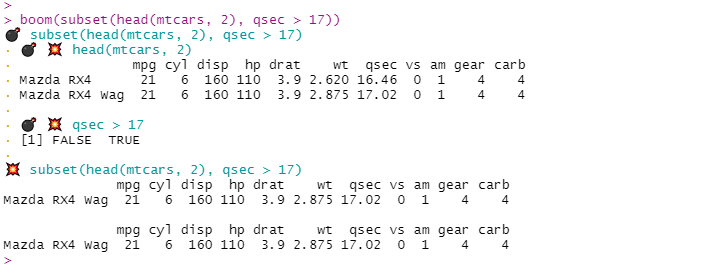
You can use boom() with {magrittr} pipes or
base R pipes: just pipe to boom() at the end of a pipe
chain.
library(magrittr)
mtcars %>%
head(2) %>%
subset(qsec > 17) %>%
boom()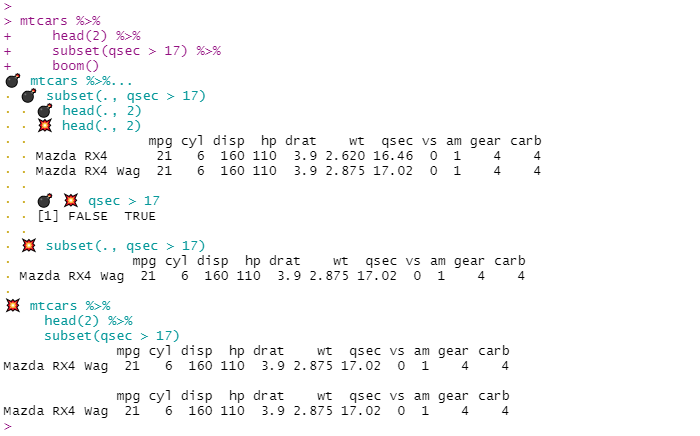
If a call fails, {boomer} will print intermediate outputs up to the occurrence of the error, it can help with debugging:
"tomato" %>%
substr(1, 3) %>%
toupper() %>%
sqrt() %>%
boom()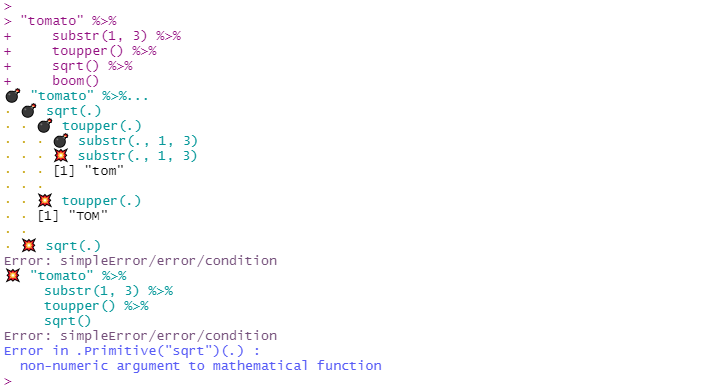
boom() features optional arguments :
clock: set to TRUE to see how long each
step (in isolation!) took to run.
print: set to a function such as str to
change what is printed (see ?boom to see how to print
differently depending on class). Useful alternatives would be
dplyr::glimpse of invisible (to print
nothing).
One use case is when the output is too long.
boom(lapply(head(cars), sqrt), clock = TRUE, print = str)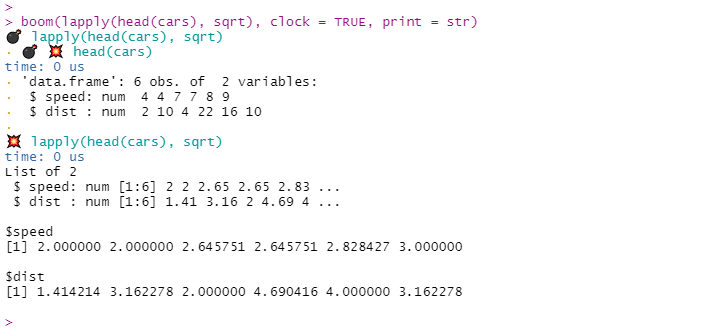
boom() also works works on loops and multi-line
expression.
boom(for(i in 1:3) paste0(i, "!"))
rig()rig() a function in order to boom() its
body, its arguments are printed by default when they’re evaluated.
hello <- function(x) {
if(!is.character(x) | length(x) != 1) {
stop("`x` should be a string")
}
paste0("Hello ", x, "!")
}
rig(hello)("world")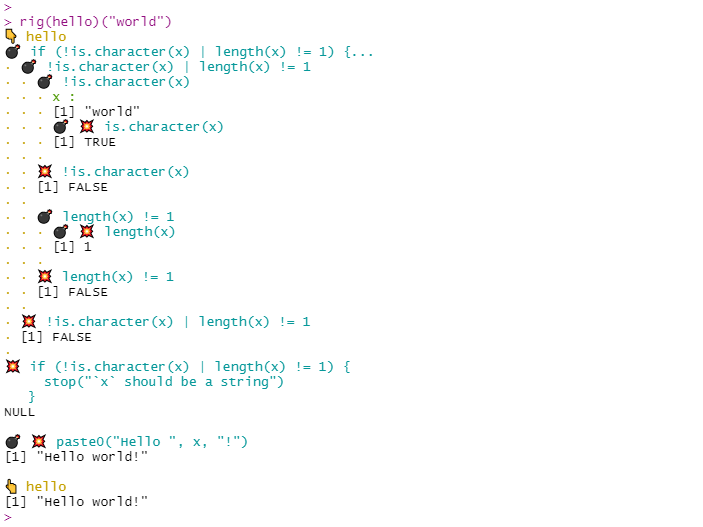
rig_in_namespace()rig() creates a copy of a function, but when developing
a package we might want to rig a function in place so it has a verbose
output when called by other functions. For this we can use
rig_in_namespace().
For instance you might have these functions in a package :
cylinder_vol <- function(r, h) {
h * disk_area(r)
}
disk_area <- function(r) {
pi * r^2
}cylinder_vol depends on disk_area, call
devtools::load_all() then rig_in_namespace()
on both and enjoy the detailed output:
devtools::load_all()
rig_in_namespace(cylinder_vol, disk_area)
cylinder_vol(3,10)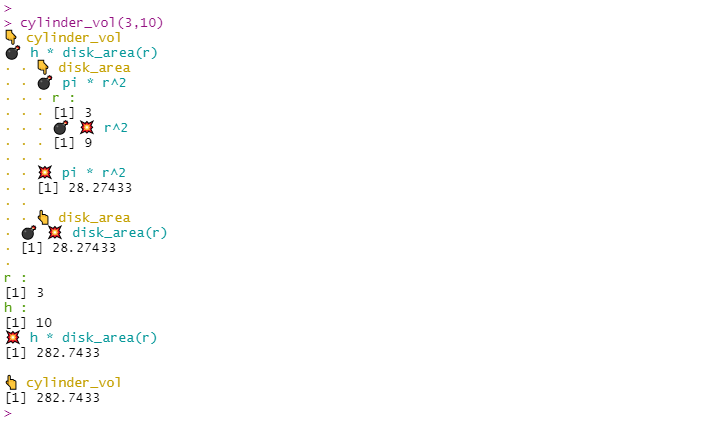
boom_on() and
boom_off()While debugging a function, call boom_on() and all
subsequent calls will be boomed, call boom_off() to return
to standard debugging.

boom_shinyApp()A very experimental feature that allows you to rig the reactives of a
shiny app. See vignette("shiny", "boomer") for more
information.
For the following app, saved in a proper project/package:
histogramUI <- function(id) {
tagList(
selectInput(NS(id, "var"), "Variable", choices = names(mtcars)),
numericInput(NS(id, "bins"), "bins", value = 10, min = 1),
plotOutput(NS(id, "hist"))
)
}
histogramServer <- function(id) {
moduleServer(id, function(input, output, session) {
data <- reactive(mtcars[[input$var]])
output$hist <- renderPlot({
hist(data(), breaks = input$bins, main = input$var)
}, res = 96)
})
}
ui <- fluidPage(
histogramUI("hist1")
)
server <- function(input, output, session) {
histogramServer("hist1")
}The output of boom_shinyApp(ui, server) will look
like:
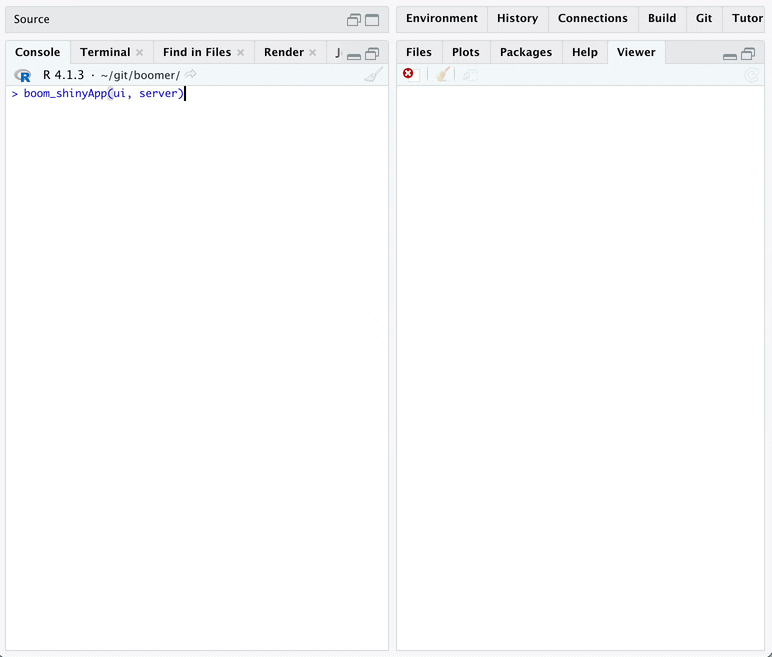
There will be issues, please report!
To avoid typing boom() all the time you can use the
provided addin named “Explode a call with boom()”:
just attribute a key combination to it (I use ctrl+shift+alt+B on
windows), select the call you’d like to explode and fire away!
Several options are proposed to weak he printed output of {boomer}’s
functions and addin, see ?boomer to learn about them.
In particular on some operating systems {boomer}’s
functions’ output might not always look good in markdown report or
reprexes. It’s due to how he system handles UTF-8 characters. In this
case one can use options(boomer.safe_print = TRUE) for a
more satisfactory input.
{boomer} prints the output of intermediate steps as they are
executed, and thus doesn’t say anything about what isn’t executed, it is
in contrast with functions like lobstr::ast() which return
the parse tree.
Thanks to @data_question for suggesting the name {boomer} on twitter.
These binaries (installable software) and packages are in development.
They may not be fully stable and should be used with caution. We make no claims about them.
Health stats visible at Monitor.